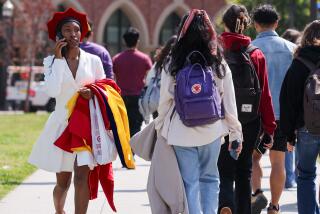O.C. School Dean Accused of Plagiarism
- Share via
The dean of a small Christian law school in Santa Ana has been suspended with pay for several weeks while authorities look into allegations that he lifted text from Encyclopaedia Britannica for an article in the school’s law journal.
The allegations concern an article that Trinity Law School dean Winston L. Frost wrote on the history of human rights for the Trinity Law Review last year. Frost, 43, also works as a part-time arbitrator and judge for the Orange County Superior Court.
Trinity Law School, which has 200 students, is housed in an office building on North Grand Avenue. It is one of four schools operated by Trinity International University, a Christian university based in Deerfield, Ill., and owned by the Evangelical Free Church of America.
Gregory L. Waybright, president of the parent university, acknowledged this week that “some portions” of the law review article “appear to be much the same as another identified article previously published by a separate author.”
The article titled “The Development of Human Rights Discourse: A History of the Human Rights Movement” was published last year, but university provost Barry J. Beitzel said he first received a letter two weeks ago alleging that Frost had plagiarized from the encyclopedia. The letter was from someone at Trinity Law, he said, but declined to give details.
Waybright said Friday that Frost has denied the allegation. He has been given until Aug. 6 to prepare a written response.
Frost did not return phone calls Friday to his Lake Forest home.
It is unclear whether the allegations will affect his work at the court. Presiding Judge Robert Jameson declined to comment on Frost’s case, and other court officials said they did not know about the allegations and could not comment.
News of the allegations has caused a stir at the law school, with both students and faculty members digging up copies of the law review and the encyclopedia to compare the two.
But the university appears to be handling the matter well, said one faculty member who asked to remain anonymous. Officials “are taking it seriously, as they should, and [are] taking the appropriate action,” the faculty member said. “Everybody deserves due process.”
Britannica officials could not be reached for comment.
There are some obvious similarities throughout the two articles. The first paragraph of Frost’s piece uses many of the same words, phrases and sentence structures as the first paragraph of the encyclopedia’s entry on the same topic--copyrighted 14 years earlier--as well as addressing the same topics in the same order.
The first sentence of the encyclopedia entry reads, “The expression ‘human rights’ is relatively new, having come into everyday parlance only since World War II and the founding of the United Nations in 1945.” Frost’s historical overview opens: “The expression ‘human rights’ is a relatively new one, having come into everyday usage after World War II and the founding of the United Nations.”
Another encyclopedia paragraph begins, “Today the vast majority of legal scholars, philosophers and moralists agree, irrespective of culture or civilization, that every human being is entitled, at least in theory, to some basic rights.” A paragraph in the law review article starts out, “Accordingly, today the vast majority of legal scholars, philosophers and moralists can agree that every human being is entitled, at least in theory, to some basic rights.”
Beitzel said that after he compared Frost’s article and the encyclopedia entry, he and Waybright sought the opinion of a law firm specializing in intellectual property.
Based on its preliminary report, he said, “We felt that it would be both legally and ethically appropriate for us to request an explanation from Dean Frost.”
After they receive Frost’s response early next month, Beitzel said, they will determine what action, if any, to take.
Waybright came to Santa Ana on Monday to discuss the university’s response to the plagiarism issue in two meetings with staff, faculty, students and board members.
Frost attended the meetings, Waybright said, and discussed the accusation.
“Basically, he said when all the facts come out that he would be vindicated,” Waybright said.
Both he and Beitzel said the university is taking the allegations seriously.
“We are a Christian school,” Beitzel said, “and truthfulness, honesty and integrity are words that we do use. And I’d like to think we have infused them with real meaning, and we take them seriously.”
The law school, accredited by the State Bar of California, but not the American Bar Assn., stresses its Christian outlook; its Web site guides viewers to a separate article written by Frost that was published on the Web site of the Christian conservative group Focus on the Family.
*
Times staff writers Thuy-Doan Le and Jason Song contributed to this report.
More to Read
Sign up for Essential California
The most important California stories and recommendations in your inbox every morning.
You may occasionally receive promotional content from the Los Angeles Times.













